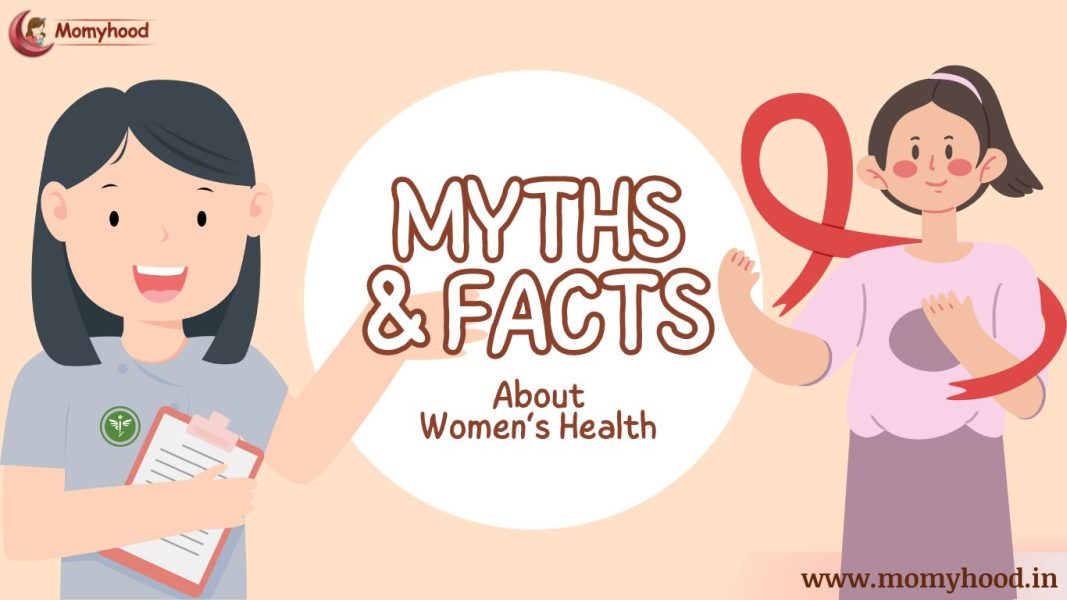Women’s health is a complex and often misunderstood topic, shaped by a mix of science, culture, and personal experiences. Over the years, several myths and misconceptions have emerged, causing unnecessary anxiety, misguided decisions, and, at times, neglect of essential healthcare. Many of these myths are deeply rooted in societal norms, traditional beliefs, or outdated information, leaving women vulnerable to making decisions that may not be in their best interest. It’s crucial to separate fact from fiction to ensure better health outcomes and empower women to make informed choices about their well-being.
In this blog, we’ll debunk some of the most common women’s health myths, so you can feel more confident and knowledgeable in your health journey. Here are some of the women’s health myths that need to be addressed.
Common Women’s Health Myths Debunked: Separating Fact from Fiction
Myth 1: Birth Control Causes Weight Gain
Fact:
The type of birth control you use can influence your weight, but it doesn’t automatically lead to weight gain. Some women may experience slight fluid retention, but this is usually temporary. If you’re concerned about weight changes, talk to your healthcare provider.
Takeaway:
Discuss with your healthcare provider to find a birth control method that best suits your needs and minimizes any unwanted side effects.
Myth 2: Breast Self-Exams Are Crucial for Detecting Cancer
Fact:
While breast awareness is important, the effectiveness of breast self-exams in detecting cancer is debatable. Regular mammograms and clinical breast exams remain the most reliable methods for early detection.
Takeaway:
Incorporate regular mammograms and clinical breast exams into your healthcare routine for effective early detection of breast cancer.
Myth 3: Only Older Women Get Heart Disease
Fact:
Heart disease is a leading cause of death for women of all ages. Symptoms in women can differ from those in men, often presenting as fatigue, shortness of breath, or jaw pain.
📣 Loved what you read? Want to go deeper into conscious parenting? ✨ The Power of Manifestation in Parenting is now available — A soulful guide packed with real-life tools like affirmations, energy shifts, and sleep talk that I personally use with my son, Hitarth. 💛 Start your journey toward calmer, connected parenting today. 🎉 Launch Offer: Only ₹99 (limited-time price!) 📲 Instant download. No waiting. 👉 Grab your copy now!.
Takeaway:
Be aware of the symptoms of heart disease and prioritize heart-healthy habits regardless of age. Regular check-ups can help monitor your cardiovascular health.
Myth 4: Cranberry Juice Prevents UTIs
Fact:
Cranberry juice might help prevent UTIs in some women, but it’s not a guaranteed cure. Staying hydrated, practicing good hygiene, and seeking medical attention when needed are essential for preventing UTIs.
Takeaway:
Maintain good hygiene practices and stay hydrated to prevent UTIs. Consult your healthcare provider for proper diagnosis and treatment.
Myth 5: All Women Experience Menopause Similarly
Fact:
Menopause symptoms vary widely among women. Some experience hot flashes, mood swings, and sleep disturbances, while others have minimal symptoms. It’s essential to discuss your specific concerns with your healthcare provider.
Takeaway:
Understand that menopause is a unique experience for each woman. Discuss your symptoms with your healthcare provider to find the best management strategies.
Myth 6: Cervical Cancer Only Affects Sexually Active Women
Fact:
While HPV, a sexually transmitted infection, is a primary cause of cervical cancer, the virus can be transmitted through skin-to-skin contact. Even women who are not sexually active can be at risk.
Takeaway:
Regular Pap smears and HPV vaccinations are crucial for cervical cancer prevention, regardless of sexual activity.
Myth 7: Antibiotics Are Always Necessary for Yeast Infections
Fact:
Not all yeast infections require antibiotics. Overuse of antibiotics can disrupt the natural balance of bacteria in the body. In many cases, over-the-counter antifungal treatments are effective.
Takeaway:
Consult your healthcare provider before using antibiotics for yeast infections. Over-the-counter antifungal treatments are often sufficient.
Myth 8: PMS is Just in Your Head
Fact:
PMS (Premenstrual Syndrome) is a real condition affecting many women. Hormone fluctuations can cause physical and emotional symptoms. If PMS significantly impacts your life, consult your healthcare provider.
Takeaway:
Acknowledge PMS as a legitimate condition and seek medical advice if it affects your daily life.
Myth 9: You Can’t Get Pregnant While Breastfeeding
Fact:
While breastfeeding can delay ovulation, it’s not a foolproof form of birth control. If you’re not ready to have another child, use additional contraception.
Takeaway:
Use reliable contraception if you want to prevent pregnancy while breastfeeding.
Myth 10: Pain During Sex Is Normal
Fact:
Painful intercourse is not normal and can be a sign of an underlyi ng issue. It’s important to discuss this with your healthcare provider to determine the cause and treatment options.
Takeaway:
Seek medical advice if you experience pain during sex to identify and treat any underlying issues.
Myth 11: Menstrual Pain is Normal and Should Be Tolerated
Fact:
Severe menstrual pain, known as dysmenorrhea, is not something you should have to endure. It can indicate conditions like endometriosis or fibroids. Consult a healthcare professional if menstrual pain interferes with your daily life.
Takeaway:
Early diagnosis and treatment can significantly improve your quality of life if you experience severe menstrual pain.
Myth 12: You Can’t Get Pregnant During Your Period
Fact:
While less likely, pregnancy during menstruation is possible. Sperm can live inside the female body for up to five days, so if you have a shorter menstrual cycle, ovulation could occur soon after your period ends.
Takeaway:
Use contraception consistently to avoid pregnancy, even during your period.
Myth 13: Women Should Avoid Exercise During Pregnancy
Fact:
Exercise is generally beneficial during pregnancy and can help improve mood, energy levels, and overall health. Consult with a healthcare provider to ensure safety.
Takeaway:
Exercise during pregnancy can be beneficial, but consult with your healthcare provider to tailor a safe routine.
Myth 14: Breast Cancer is the Only Cancer Women Need to Worry About
Fact:
Women should also be aware of other cancers, such as cervical, ovarian, and uterine cancer. Regular screenings are essential for early detection.
Takeaway:
Stay informed about different cancers and prioritize regular health screenings.
Myth 15: Osteoporosis Only Affects Older Women
Fact:
Osteoporosis can start developing at a younger age, especially with risk factors like family history or certain medications. Preventive measures should begin early.
Takeaway:
Discuss your risk factors with your healthcare provider and make lifestyle changes to strengthen your bones.
Myth 16: Hormone Replacement Therapy (HRT) is Dangerous
Fact:
HRT can be beneficial for many women experiencing severe menopausal symptoms. Discuss the benefits and risks with your healthcare provider to determine if HRT is right for you.
Takeaway:
Work with your healthcare provider to make an informed decision about HRT based on your individual needs. Click here to know more about HRT.
Myth 17: Pap Smears Detect All Gynecological Cancers
Fact:
Pap smears detect cervical cancer, not ovarian, uterine, or other gynecological cancers. Different tests are required for different cancers.
Takeaway:
Discuss appropriate screenings with your healthcare provider for comprehensive gynecological care.
Myth 18: Heart Disease is Primarily a Man’s Issue
Fact:
Heart disease is the leading cause of death in women, and symptoms can differ from men’s. Adopt heart-healthy habits and undergo regular check-ups.
Takeaway:
Recognize the unique symptoms women may experience and prioritize heart health.
Myth 19: Vaginal Health Can Be Maintained with Over-the-Counter Products
Fact:
Many over-the-counter products can disrupt the natural balance of the vagina. Simple hygiene practices are usually sufficient.
Takeaway:
Avoid unnecessary products and seek medical advice for persistent issues.
Myth 20: Mental Health Issues Are Less Serious Than Physical Health Issues
Fact:
Mental health is as important as physical health. Conditions like depression and anxiety significantly impact well-being. Seek support when needed.
Takeaway:
Acknowledge the importance of mental health and explore treatment options.
Addressing Cultural and Societal Influences
Let’s delve deeper into how cultural and societal influences contribute to the perpetuation of these myths. Understanding these contexts can give you all a broader perspective on why certain misconceptions persist and how they can be challenged.
Cultural Influences
- Taboos and Stigma: In many cultures, topics like menstruation, menopause, and mental health are considered taboo, leading to a lack of open discussion and understanding. This silence can perpetuate myths and misinformation, as women may feel uncomfortable seeking accurate information or medical advice.
- Traditional Beliefs: Some cultures hold traditional beliefs about women’s roles and health, such as the idea that women should tolerate pain or that certain conditions are just part of being a woman. These beliefs can prevent women from seeking necessary medical care and contribute to the normalization of issues like menstrual pain or painful intercourse.
- Gender Roles: Societal expectations around gender roles can influence how women’s health is perceived. For instance, the misconception that heart disease is primarily a man’s issue may arise from stereotypes about men being more physically active or stressed in their work roles, neglecting the unique risk factors and symptoms women face.
Societal Influences
- Media Representation: Media often portrays idealized versions of women’s health and beauty, which can shape public perceptions and expectations. For example, advertisements for weight loss or beauty products may contribute to the myth that certain body types or appearances are inherently healthier.
- Healthcare Access: Societal disparities in healthcare access can impact women’s health knowledge and care. Women in marginalized communities may face barriers to accessing accurate health information or receiving timely medical treatment, exacerbating the impact of health myths.
- Educational Gaps: Lack of comprehensive health education can leave women without the necessary tools to understand their bodies and health needs, making them more susceptible to believing in myths and misinformation.
Preventive Health Strategies
Regular Screenings
Encourage regular health screenings and check-ups, such as mammograms, Pap smears, and heart health evaluations, to catch potential issues early and ensure timely intervention.
Healthy Lifestyle Choices
Highlight the importance of maintaining a balanced diet, regular exercise, and adequate sleep in promoting overall health and reducing the risk of conditions like heart disease, osteoporosis, and mental health issues.
Stress Management
Discuss the role of stress management techniques, such as mindfulness, meditation, and yoga, in supporting mental and physical well-being. Effective stress management can mitigate the impact of myths that dismiss conditions like PMS or mental health concerns.
Vaccinations and Preventive Care
Emphasize the importance of vaccinations, such as the HPV vaccine, in preventing diseases like cervical cancer. Preventive care can play a significant role in reducing the risk of certain health issues.
Open Communication
Encourage open communication with healthcare providers about any concerns or symptoms. Building a trusting relationship with medical professionals can lead to better health outcomes and debunk myths that discourage seeking care.
How to Identify Reliable Health Information
In the age of the internet, evaluating health information critically is crucial. Here are some tips for finding reliable sources:
- Check the Source: Trust information from reputable medical organizations, universities, and government health departments.
- Consult Professionals: Discuss health concerns with qualified healthcare providers who can provide personalized advice.
- Be Skeptical of Sensational Claims: If something sounds too good to be true, it likely is. Look for evidence-based information supported by research.
Conclusion
Debunking myths and understanding the facts about women’s health is essential for making informed decisions and maintaining well-being. By staying informed and seeking regular medical advice, you can take charge of your health and empower others to do the same. Let’s continue the conversation about women’s health and break down the barriers that myths create. Share this article with your friends and family to spread awareness and encourage open discussions.
References
- Office on Women’s Health
- Centers for Disease Control and Prevention (CDC)
- National Institutes of Health (NIH)
Disclaimer
This information is intended for general knowledge and informational purposes only, and does not constitute medical advice. Always consult with a qualified healthcare professional for any medical concerns or questions.
Editor’s Recommendations
How My Husband’s Free Time Increased My Stress and What I Did About It
Ginger Oil for Postpartum Weight Loss: Ignite Your Holistic Journey to Wellness
Your comments and shares do more than just support our blog—they uplift the amazing moms who share their stories here. Please scroll down to the end of the page to leave your thoughts, and use the buttons just below this line to share. Your support makes a big difference!



